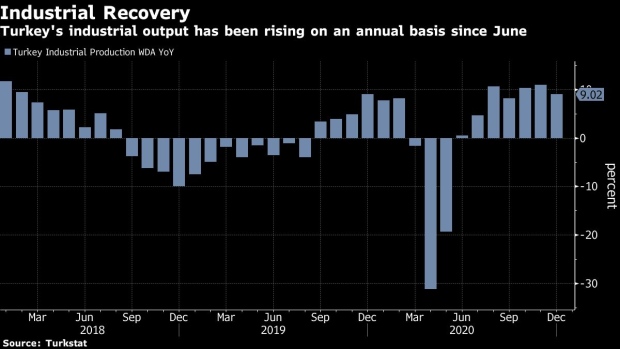Feb 28, 2021
Pandemic Binge Likely Spurred Turkey to Top of Growth League
, Bloomberg News

(Bloomberg) -- Turkey’s $736 billion economy outperformed major competitors in the final quarter as rate cuts and a spending-and-credit binge beat back pandemic restrictions even as the lira collapsed, data will likely show Monday.
Gross domestic probably rose 7.4% from a year earlier, according to the median of 14 forecasts in a Bloomberg survey, more than in any other G-20 nation, including China. The growth push weakened the currency by 20% in 2020 and kept headline inflation in double digits for the entire year.
The data will expose the challenge facing central bank Governor Naci Agbal as he looks to cool growth and restore price stability without triggering a steep slowdown in activity and a jump in unemployment.
“The key drivers of the economic activity in the last quarter were industrial production and credit growth,” said Can Ayan, an Istanbul-based economist at Aktif Bank, who ranks second among forecasters of Turkish GDP data. Consumption and government spending will support activity in the first quarter of 2021, lifting growth over the year to 5.2%, Ayan said.
The government had pushed banks to ramp up lending to help businesses and consumers ride out the Covid emergency. The credit boom was coupled with a front-loaded easing cycle that helped prime the economy.
Agbal has raised the benchmark interest rate by 675 basis points to 17% following his appointment in November, signaling a return to more market-friendly monetary policy. The lira has strengthened 15% since his appointment.
The International Monetary Fund raised its growth forecast for Turkey’s economy to 6% in 2021 amid the coronavirus vaccine rollout, while warning the pandemic response worsened pre-existing financial risks despite leading to a strong rebound in economic activity.
“With some stability in the currency market, Turkish exporters can finally enjoy the price competitiveness accumulated over recent years,” said JPMorgan Chase & Co.’s London-based analyst Yarkin Cebeci. “Depending on the pace of vaccinations, tourism will most probably be stronger than last year as well.”
©2021 Bloomberg L.P.